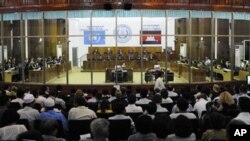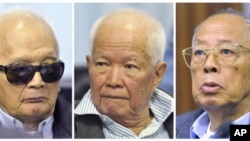PHNOM PENH —
The United Nations-backed tribunal investigating Cambodia's murderous Khmer Rouge movement ran into more trouble this week, suspending hearings after a strike over unpaid wages and the illness of one of the three defendants.
It has been an eventful week for the embattled Khmer Rouge tribunal. On Monday, as British journalist and author Philip Short prepared to take the stand to start several days of testimony, the entire Cambodian translation team went on strike over unpaid wages.
The Khmer Rouge tribunal operates in three languages - Khmer, French and English. Without the Cambodian translators, there was no way it could proceed. Hearings remain suspended.
The United Nations pays the wages of the international employees, while the Cambodian government is responsible for the salaries of national staff. None of the Cambodian staff has been paid since November.
Since the court opened in 2006, the government has contributed around $15 million in cash and in kind to the tribunal, but has relied on foreign donors to foot its portion of the wages bill.
Funding issues
Government spokesman Ek Tha reckons donors are reluctant to pay because they have to contend with their own financial issues. He insists the government is committed to the tribunal, and is adamant that it will not collapse.
The situation, says Anne Heindel, a legal adviser with the research organization the Documentation Center of Cambodia, or DC-Cam, has produced a standoff between donors and government.
"It seems as if donors are not willing to provide that funding any more, and the international side is having its own difficulties getting funded, and has over the last few years had its own share of crises, and at least at the moment it appears there's no state willing to step in and fill that gap," she said.
Defendent absent
Later on Monday it emerged that one of the three defendants - the former foreign minister Ieng Sary - had been taken to hospital.
At 87, Ieng Sary is the oldest of the defendants and widely regarded as the most frail. On Wednesday, one news outlet reported that Ieng Sary's health was critical. Michael Karnavas, Ieng Sary's international defense lawyer, would not go that far but he did say his client's health is extremely serious.
The health of the three defendants - who are in their 80s - has long been a concern. In January, Nuon Chea, known as Brother Number Two, was treated in hospital for acute bronchitis. Khieu Samphan, the former head of state, was also hospitalized for fatigue and shortness of breath.
Later this month the tribunal will hold health hearings for Ieng Sary and Nuon Chea. Michael Karnavas says Ieng Sary's heart problems and other ailments mean he is unable to take a meaningful part in his own defense.
"Were you to ask me: Do you see him being able to be in court any time soon? The answer is no. If he comes back in court and he's in the present condition, is he able to follow the proceedings? The answer is no," he said.
Previously the three defendants have waived their right to be present in court, which has allowed hearings to continue in their absence. Michael Karnavas says Ieng Sary will no longer issue a waiver.
"So effectively the trial will have to come to a grinding halt until such time as he's better. And I think right now the situation is more or less ripe to start considering severance," he said.
Should Ieng Sary's case be severed, that would effectively mean the end of his trial.
Mini-trials in jeopardy
DC-Cam's Anne Heindel says the tribunal's woes go beyond health issues and funding. Last month, the Trial Chamber was ordered to revisit its 2011 decision that divided "Case Two," as the case against the ex-leaders is known, into several mini-trials. The first of those smaller trials, which began more than a year ago, has mainly addressed the forced movement of people in 1975.
However, few people expect the tribunal to ever proceed past this first mini-trial, and that meant the judges effectively excluded the crimes that affected most Cambodians, who spent the years from 1975 to 1979 enslaved in work camps.
In the coming weeks, the Trial Chamber will decide which crimes to add to the first mini-trial. However Heindel believes key charges will remain absent.
"I don't expect we'll hear anything about genocide, about forced marriage, about work sites - things that average Cambodians find quite important, or survivors find quite important, because they relate to their experiences during the regime," she said.
Heindel says the confluence of all of these issues is damaging.
"It's not looking good for the court's legacy because Case Two is the court's centerpiece case: it was supposed to address the senior surviving leaders, it's supposed to address crimes throughout Cambodia," she said.
Two million people died during the Khmer Rouge's rule of Cambodia between 1975 and 1979. Three decades later the tribunal's ongoing problems risk overwhelming its central purpose: to deliver a vital reckoning for some of the worst crimes of the 20th century.
It has been an eventful week for the embattled Khmer Rouge tribunal. On Monday, as British journalist and author Philip Short prepared to take the stand to start several days of testimony, the entire Cambodian translation team went on strike over unpaid wages.
The Khmer Rouge tribunal operates in three languages - Khmer, French and English. Without the Cambodian translators, there was no way it could proceed. Hearings remain suspended.
The United Nations pays the wages of the international employees, while the Cambodian government is responsible for the salaries of national staff. None of the Cambodian staff has been paid since November.
Since the court opened in 2006, the government has contributed around $15 million in cash and in kind to the tribunal, but has relied on foreign donors to foot its portion of the wages bill.
Funding issues
Government spokesman Ek Tha reckons donors are reluctant to pay because they have to contend with their own financial issues. He insists the government is committed to the tribunal, and is adamant that it will not collapse.
The situation, says Anne Heindel, a legal adviser with the research organization the Documentation Center of Cambodia, or DC-Cam, has produced a standoff between donors and government.
"It seems as if donors are not willing to provide that funding any more, and the international side is having its own difficulties getting funded, and has over the last few years had its own share of crises, and at least at the moment it appears there's no state willing to step in and fill that gap," she said.
Defendent absent
Later on Monday it emerged that one of the three defendants - the former foreign minister Ieng Sary - had been taken to hospital.
At 87, Ieng Sary is the oldest of the defendants and widely regarded as the most frail. On Wednesday, one news outlet reported that Ieng Sary's health was critical. Michael Karnavas, Ieng Sary's international defense lawyer, would not go that far but he did say his client's health is extremely serious.
The health of the three defendants - who are in their 80s - has long been a concern. In January, Nuon Chea, known as Brother Number Two, was treated in hospital for acute bronchitis. Khieu Samphan, the former head of state, was also hospitalized for fatigue and shortness of breath.
Later this month the tribunal will hold health hearings for Ieng Sary and Nuon Chea. Michael Karnavas says Ieng Sary's heart problems and other ailments mean he is unable to take a meaningful part in his own defense.
"Were you to ask me: Do you see him being able to be in court any time soon? The answer is no. If he comes back in court and he's in the present condition, is he able to follow the proceedings? The answer is no," he said.
Previously the three defendants have waived their right to be present in court, which has allowed hearings to continue in their absence. Michael Karnavas says Ieng Sary will no longer issue a waiver.
"So effectively the trial will have to come to a grinding halt until such time as he's better. And I think right now the situation is more or less ripe to start considering severance," he said.
Should Ieng Sary's case be severed, that would effectively mean the end of his trial.
Mini-trials in jeopardy
DC-Cam's Anne Heindel says the tribunal's woes go beyond health issues and funding. Last month, the Trial Chamber was ordered to revisit its 2011 decision that divided "Case Two," as the case against the ex-leaders is known, into several mini-trials. The first of those smaller trials, which began more than a year ago, has mainly addressed the forced movement of people in 1975.
However, few people expect the tribunal to ever proceed past this first mini-trial, and that meant the judges effectively excluded the crimes that affected most Cambodians, who spent the years from 1975 to 1979 enslaved in work camps.
In the coming weeks, the Trial Chamber will decide which crimes to add to the first mini-trial. However Heindel believes key charges will remain absent.
"I don't expect we'll hear anything about genocide, about forced marriage, about work sites - things that average Cambodians find quite important, or survivors find quite important, because they relate to their experiences during the regime," she said.
Heindel says the confluence of all of these issues is damaging.
"It's not looking good for the court's legacy because Case Two is the court's centerpiece case: it was supposed to address the senior surviving leaders, it's supposed to address crimes throughout Cambodia," she said.
Two million people died during the Khmer Rouge's rule of Cambodia between 1975 and 1979. Three decades later the tribunal's ongoing problems risk overwhelming its central purpose: to deliver a vital reckoning for some of the worst crimes of the 20th century.





